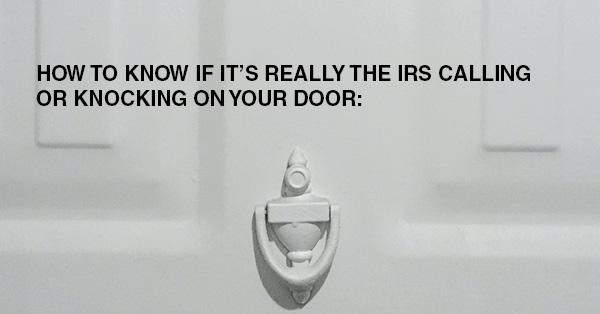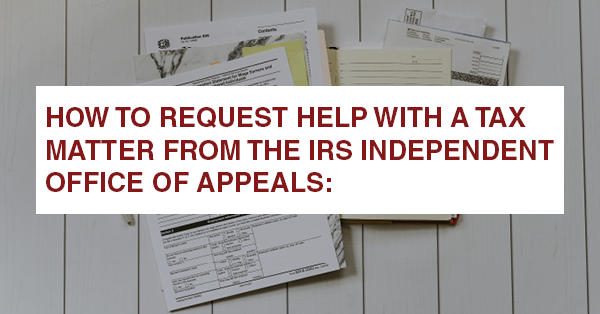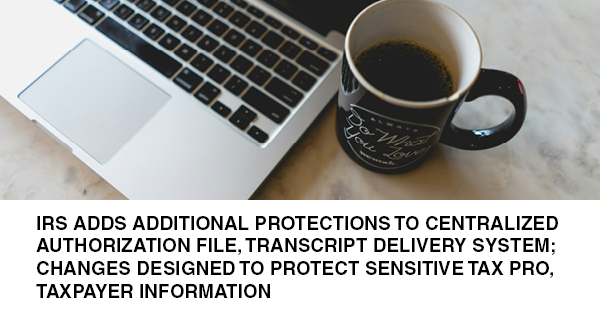HOW TO KNOW IF IT’S REALLY THE IRS CALLING OR KNOCKING ON YOUR DOOR:

The IRS wants you to understand how and when the IRS contacts taxpayers, and help you determine whether a contact you may have received is truly from an IRS employee.
The IRS initiates most contacts through regular mail delivered by the United States Postal Service.
However, there are circumstances in which the IRS will call or come to a home or business. These include when a taxpayer has an overdue tax bill, a delinquent (unfiled) tax return or has not made an employment tax deposit. An IRS employee may also view assets or tour a business as part of a collection investigation, an audit or an ongoing criminal investigation. Even then, taxpayers will generally first receive several letters from the IRS in the mail.
For years, the IRS has made clear that their first contact with you will not be a text or email. But it turns out that it might be a knock on your door.
Residents of Floyd County, Georgia, were surprised recently when they saw a man visiting homes claiming to be from the IRS. Several residents called the police—one even sent them a video of the man who claimed to be an IRS worker. It turns out that he really did work for the IRS.
Police officers stopped by his Smyrna, Georgia address—and found a legitimate IRS office. There are several offices in that general area, including Taxpayer Assistance Centers.
The IRS employee explained that he was visiting on legitimate IRS business and said that other IRS workers could make an appearance in the future. Local police in the area have asked the IRS for a heads-up before making future house calls, but it's not clear whether they agreed.
When the IRS was asked about the visit, they advised, “This is not a new situation. For many years, in limited circumstances, employees may visit a taxpayer’s home or business. These visits are carefully regulated, and compliance employees are trained in respecting taxpayer rights.”
The IRS has previously confirmed online that circumstances could lead to an in-person call or visit. That includes instances when a taxpayer has an overdue tax bill, an unfiled tax return, or has not made an employment tax deposit. An IRS employee may also want to see your home office or tour your business as part of an audit or ongoing criminal investigation.
The IRS examines or audits tax returns to verify that what the taxpayer reported is correct.
- IRS employees conducting audits may call taxpayers, but not without having first attempted to notify them by mail. After mailing an official notification of an audit, an auditor/tax examiner may call to discuss items pertaining to the audit.
- IRS employees may visit the taxpayer’s home or business without notification to the taxpayer if attempts to communicate with the taxpayer in other ways, such as letters or phone calls, are not successful.
- An audit will include an interview with the taxpayer or his/her power of attorney, if one is appointed, and often include a tour of the taxpayer’s business operation.
- Third party contacts – if while examining a taxpayer’s return, the IRS needs information from someone else, they will issue a letter to the third party requesting the information. After that the IRS may contact them by phone. Alternatively, we may visit the third party’s home or business first to deliver the notices/letters requesting information. We may also visit the third party’s home or business without notification to the third party if attempts to communicate with the third party in other ways, such as letters or phone calls, are not successful.
Revenue agents carry two forms of official identification, IRS-issued credentials (also called a pocket commission) and a HSPD-12 card. The HSPD-12 card is a governmentwide standard form of identification for federal employees. Both forms of identification have serial numbers and photos of the employee – and you can ask to see both. When at a home or place of business, the revenue agent can also provide an additional method to verify their identification upon request.
Collection
Revenue officers are IRS civil enforcement employees who work cases that involve an amount owed by a taxpayer or a delinquent tax return. Their role involves education, investigation, and appropriate enforcement actions.
Generally, home or business visits are unannounced due to the urgency of the matter (for example, the collection of unpaid employment taxes).
Revenue officers carry two forms of official identification, IRS-issued credentials (also called a pocket commission) and a HSPD-12 card. The HSPD-12 card is a governmentwide standard form of identification for federal employees. Both forms of identification have serial numbers and photos of the employee – and you can ask to see both. When at a home or place of business, the revenue officer can also provide an additional method to verify their identification upon request.
Revenue Officer Visits
You can use these tips to help verify that the revenue officer visiting you is an IRS employee:
- Many collection cases begin as letters (called “notices”) sent by mail to taxpayers because the case is unresolved. Some of the cases assigned to a revenue officer were also previously worked by the Automated Collection System (ACS). ACS is an IRS program that tries to directly resolve a taxpayer’s account over the phone if their situation wasn’t resolved by a response to a previously sent notice.
- A revenue officer will help you understand your tax obligations as well as the consequences for not meeting the obligations. The revenue officer will ensure you understand your rights and obligations as a taxpayer.
- A portion of a revenue officer's work involves outreach to employers, called Federal Tax Deposit Alerts. These alerts are designed to help businesses from falling behind on withheld employment taxes before a balance due notice is created or mailed.
- Field Contact Letter
- If the taxpayer is not present when the revenue officer visits the business, they may leave a Field Contact Letter – L5664. The revenue officer will enclose the letter in a sealed envelope, addressed to the corporate officer or business owner. The letter explains the purpose of the field visit and requests the employer contact the revenue officer to discuss why there is a change in their federal tax deposits.
- Telephone Contact Letter
- In rare instances, the revenue officer may contact the employer first by telephone. Those contacts will be preceded by Telephone Contact Letter – L5857. The letter notifies the employer that the initial contact will be made by phone on a specific date.
- This letter is not required before making initial contact in person but is required when it is by phone.
- Field Contact Letter
The IRS does not:
- Call to demand that a taxpayer use a payment method such as a prepaid debit card or gift card. Generally, the IRS will first mail a bill to any taxpayer who owes taxes.
- Send text messages or contact people through social media.
- Demand that you pay taxes without the opportunity to question or appeal the amount owed. They will advise you of your rights as a taxpayer.
- Threaten to bring in local police, immigration officers or other law-enforcement to have you arrested for not paying. The IRS also cannot revoke your driver’s license, business licenses or immigration status. Threats like these are common tactics used by scam artists to trick victims into buying into their schemes.
Payments:
If you have an outstanding federal tax debt, the revenue officer will request payment by cash, check, certified funds or money order payable to “United States Treasury.” The IRS provides specific guidelines on how you can make a tax payment at IRS.gov/payments.
- If you have any concerns about making a payment by check, payments can be made online using the Electronic Federal Tax Payment System (EFTPS) for both personal and business taxes.
Criminal Investigation
IRS criminal investigators may visit a taxpayer’s home or business unannounced during an investigation. However, they will not demand any sort of payment.
Beware of Impersonations
Scams take many shapes and forms, such as phone calls, letters and emails. Many IRS impersonators use threats to intimidate and bully people into paying a fabricated tax bill. They may even threaten to arrest or deport their would-be victim if they don’t comply.
How To Report Scams: Taxpayers can use these options to report phone, email and other impersonation scams:
- Report impersonation scams to the Treasury Inspector General for Tax Administration on the IRS Impersonation Scam Reporting webpage. Taxpayers can also call 800-366-4484 to report impersonation scams.
- Report phone scams to the Federal Trade Commission using the FTC Complaint Assistant. Add "IRS Telephone Scam" in the notes.
- Report an unsolicited email claiming to be from the IRS or an IRS-related system like the Electronic Federal Tax Payment System to the IRS at phishing@irs.gov.
- Protect your community by reporting fraud, scams, and bad business practices. Report fraud to Report Fraud FTC.
- For a comprehensive listing of recent tax scams, consumer alerts and how to report them, visit Tax Scams/Consumer Alerts.




